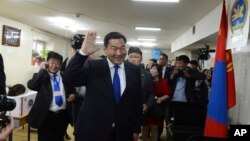Mongolians head to the polls Wednesday to elect a new president, with all three candidates promising to use the country's massive mineral wealth to help its still poor population.
President Elbegdorj Tsakhia of the ruling Democratic Party is expected to win a second four-year term. The Harvard-educated leader campaigned on promises of fighting corruption and using foreign cash to drive development.
Elbegdorj's main rival is former wrestling champion. Baterdene Badmaanyambuu. The opposition Mongolian People's Party lawmaker has promised to protect the environment and uphold national unity.
A third candidate, Health Minister Natsag Udval, is the first woman to seek Mongolia's top office. She belongs to the Mongolian People's Revolutionary Party and supports ex-President Enkhbayar Nambar, who is jailed on corruption charges.
Polls opened at 7:00 a.m. local time on Wednesday. There will be a run-off election on July 10 if no candidate wins more than 50 percent of the vote.
Mongolia boasts one of the world's fastest growing economies, thanks to a jump in revenue from its still largely untapped reserves of gold, copper and iron. Its economy grew by 17 percent in 2011 and 12 percent last year.
But many complain they have not benefited from the newfound wealth. There are also concerns over environmental damage to rural areas as a result of the mining boom.
All three candidates say they support a fairer distribution of that wealth to the country's 2.8 million people, a third of whom live below the poverty line.
The resource-rich country is a former Soviet client state that ended seven decades of communist rule in 1990. A strong U.S. ally, Mongolia held its first elections in 1992.
President Elbegdorj Tsakhia of the ruling Democratic Party is expected to win a second four-year term. The Harvard-educated leader campaigned on promises of fighting corruption and using foreign cash to drive development.
Elbegdorj's main rival is former wrestling champion. Baterdene Badmaanyambuu. The opposition Mongolian People's Party lawmaker has promised to protect the environment and uphold national unity.
A third candidate, Health Minister Natsag Udval, is the first woman to seek Mongolia's top office. She belongs to the Mongolian People's Revolutionary Party and supports ex-President Enkhbayar Nambar, who is jailed on corruption charges.
Polls opened at 7:00 a.m. local time on Wednesday. There will be a run-off election on July 10 if no candidate wins more than 50 percent of the vote.
Mongolia boasts one of the world's fastest growing economies, thanks to a jump in revenue from its still largely untapped reserves of gold, copper and iron. Its economy grew by 17 percent in 2011 and 12 percent last year.
But many complain they have not benefited from the newfound wealth. There are also concerns over environmental damage to rural areas as a result of the mining boom.
All three candidates say they support a fairer distribution of that wealth to the country's 2.8 million people, a third of whom live below the poverty line.
The resource-rich country is a former Soviet client state that ended seven decades of communist rule in 1990. A strong U.S. ally, Mongolia held its first elections in 1992.
